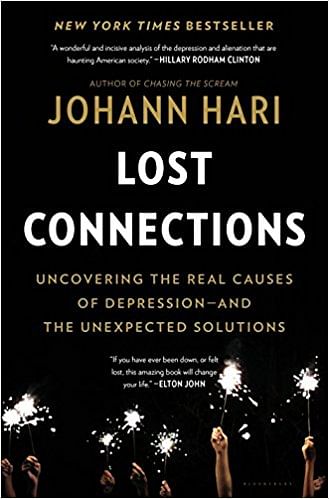
Hari uses his own experience of anti-depressant abuse and the discovery of a complicit system of over-prescription in the health industry to ask the one question the doctor failed to — Tell me about your life.
As one of the 322 million people in the world who suffer from the haunting spectre of clinical depression, Johann Hari’s new book offered me a fleeting window of life-changing hope, but it lasted just as long as it took me to finish the last page.
On reflection, one realises that it will take no less than a complete rewriting of the current socio-economic order to arrive at the perfect intersection of the changes he is suggesting. This is not to say that there is no value in taking small steps towards the impossible ideal; progress, after all, needs a guiding star to direct its energy. However, Hari’s casual “go big or go home” write-off to pragmatism reveals a weak understanding of structural realities in an extremely inequitable world.
Lost Connections: Uncovering The Real Causes of Depression — And The Unexpected Solutions is part personal self-discovery and part academic investigation, which, despite its flaws, pushes hard and effectively against the largely accepted narrative that depression is primarily a chemical imbalance in the brain that can be fixed with modern medicine. If depression is not solely a ‘disease’ in the conventional sense, then what is it? And why are over 322 million people suffering?
The author shifts the point of reference, saying that while there is indeed an illness, we’ve just been looking in all the wrong places, and that “it is not in our heads. It is, I discovered, largely in the world, and the way we are living in it”.
For someone who had grown comfortable with the story of “there’s something wrong with my brain,” this was truly eye-opening.
However, in terms of the narrative, the book follows a largely predictable pattern that moves from a thought to an anecdote, case study or interview with an expert, to finally an extrapolated life lesson. At one point in the book, Hari talks about how “most of us aren’t — in this environment, as it stands today— going to get work that we find personally meaningful”. With bated breath, I waited for a story that would somehow explain away the injustices of caste oppression, or racial discrimination, or gender bias, or cycles of poverty, or limited access for people with disabilities, but Hari didn’t.
Lost Connections, however many short-cuts it takes, is a book that everyone who can afford to, with or without depression, should read. At a time when the rise of divisive self-interest has resulted in an imminent Brexit and the election of Donald Trump, a thorough inspection of the values that govern our daily life is essential. The truth is, we really have lost touch with what matters — community, purpose, and tolerance, to name a few — and Johann Hari’s book is a compass that points us back in the right direction.






COMMENTS